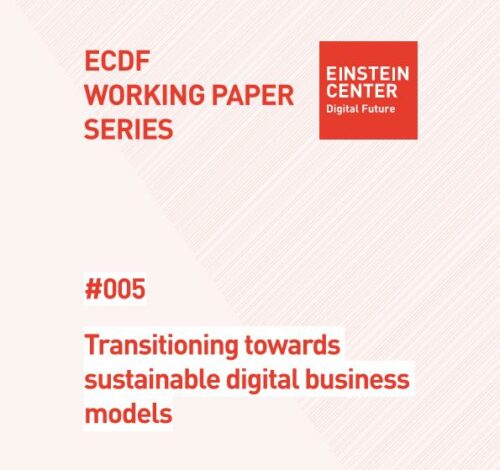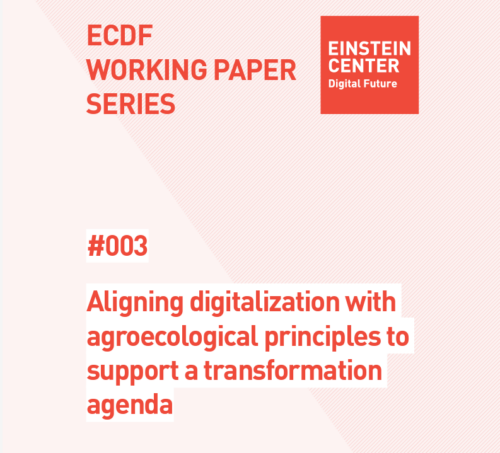Discussion Paper Series
Environmental effects along the life cycle of digital technologies
DOI: https://doi.org/10.14279/depositonce-17954
Authors: Johanna Pohl, Simon Hinterholzer
The production, operation, and disposal of digital technologies consume energy and resources causing further environmental impacts. There are a large number of studies that seek to determine these impacts. In this report, we analyse the results of selected studies, identify environmentally relevant trends, and show which policy measures are needed to address the environmental challenges of digital technologies.
View Abstract
The production, operation and disposal of digital technologies consume energy and resources causing further environmental impacts such as GHG emissions, toxicity, abiotic depletion, and water depletion. There are a large number of studies that seek to determine these impacts. However, the results of some of these studies differ considerably due to inconsistent study design and assumptions on the future development of the electricity demand of data centres and communication networks. In this report, we analyse the results of selected studies in light of the way they were modelled, and identify environmentally relevant trends. Based on our analysis, we show which policy measures are needed to address the environmental challenges of digital technologies.
Transitioning towards sustainable digital business models
DOI: https://doi.org/10.14279/depositonce-17703
Author: Hugues Ferreboeuf
The unsustainable growth of the digital environmental footprint over the last decade is due to the rapid growth of digital “volumes”, which have outpaced efficiency gains. This growth is a result of the business models of the dominant players of the digital economy, namely the largest digital platforms (GAFAM, BATX) and their derivatives (Netflix, TikTok etc.). To make digitalization sustainable, a transi-tion away from these digital superpowers is necessary, and alternative, sustainable business models must be adopted. The initiation and acceleration of this transition requires the implementation of appropriate public policies.
View Abstract
The unsustainable growth of the digital environmental footprint over the last decade is due
to the rapid growth of digital “volumes”, which have outpaced efficiency gains. This growth is
a result of the business models of the dominant players of the digital economy, namely the
largest digital platforms (GAFAM, BATX) and their derivatives (Netflix, TikTok etc.). To make
digitalization sustainable, a transi-tion away from these digital superpowers is necessary, and
alternative, sustainable business models must be adopted. The initiation and acceleration of
this transition requires the implementation of appropriate public policies.
Digitalization and Growth Independence: Utilizing Technologies for Environmental and Economic Resilience
DOI: https://doi.org/10.14279/depositonce-16550
Authors: Steffen Lange
The past years have recurrently seen crises linked to economic recessions – prominently the Covid-19 pandemic, Russia’s war in Ukraine and the impacts of climate change. Economies need to be made resilient to such recurring turmoils and recessions. In parallel, sustainability strategies should not rely solely on decoupling emissions and resource consumption from economic growth. The necessary speed of transformation to limit climate change and biodiversity loss makes it questionable whether decoupling alone can suffice. This report shows that digital technologies are no game changer in facilitating sufficient decoupling and green growth for a combination of reasons: their low energy efficiency improvements and substantial environmental footprints as well as the limited substitution of digital services for physical goods and rebound and induction effects.
View Abstract
The past years have recurrently seen crises linked to economic recessions – prominently the Covid-19 pandemic, Russia’s war in Ukraine and the impacts of climate change. Economies need to be made resilient to such recurring turmoils and recessions. In parallel, sustainability strategies should not rely solely on decoupling emissions and resource consumption from economic growth. The necessary speed of transformation to limit climate change and biodiversity loss makes it questionable whether decoupling alone can suffice. This report shows that digital technologies are no game changer in facilitating sufficient decoupling and green growth for a combination of reasons: their low energy efficiency improvements and substantial environmental footprints as well as the limited substitution of digital services for physical goods and rebound and induction effects. The report further explores how digitalization can be utilized for sustainability, resilience and growth independence. Two aspects are of central importance. First, making growth-dependent institutions independent of economic growth becomes even more essential as digital technologies put pressure on employment and the financing of the welfare state. Second, digital technologies can help in realizing sufficiency strategies such as substitution, sharing, second-hand, repairing and subsistence. A combination of macroeconomic and sectoral policies could guide digital innovations towards growth-independent, sufficient and resilient economies. Policies need to include a change in the relative prices of resources and energy vs. labour, multiple instruments for each economic sector, a strong welfare state and new actors who develop and design digital technologies.
Aligning digitalization with agroecological principles to support a transformation agenda
DOI: https://doi.org/10.14279/depositonce-16472
Authors: Angelika Hilbeck, Hannah McCarrick, Eugenio Tisselli, Johanna Pohl, Dorothea Kleine
This paper explores how ICT tools could support the transformation of the current industrial agriculture into a truly sustainable agroecological form, using a set of principles that offers guidance for the integration of ICTs into context-based, farmer-centered transitions to agroecology. Their implementation is further discussed in case studies from the East African country Tanzania.
View Abstract
In this paper, we, firstly, critique the current forms of digitalisation of industrial agriculture and its ICT (information and communication technology) tools implemented with promises of achieving efficiency gains and sustainability goals. In the second part, we explore how ICT tools could support the transformation of these industrial forms of agriculture into truly sustainable agroecological forms. For this, we summarized proposed principles that offer guidance for the integration of ICTs into context-based, farmer-centered transitions to agroecology as recently published by IFOAM (International Federation of Organic Agriculture Movements) and present examples for illustration from the East African country of Tanzania. While the examples we draw from are situated in a lower-middle-income country, the lessons learned and challenges identified may apply to other countries as well. Our main premise is that applying ICTs to support the transition toward agroecological food systems can be best achieved if ICT tools and platforms are developed according to principles that are in line with the key elements of agroecology as proposed by FAO (2018): 1) diversity, 2) co-creation and sharing of knowledge, 3) synergies, 4) efficiency, 5) recycling, 6) resilience, 7) human and social values, 8) culture and food traditions, 9) responsible governance, and 10) circular and solidarity economy, into the field of ICTs. However, the practical implementation of these principles for ICT for agroecology is a complex task that needs to carefully consider local environments and contexts at every step, as well as reconsidering the role of ICTs.
Changing the Nature of ‘Things’
DOI: https://doi.org/10.14279/depositonce-16315
Authors: Tomas Diez and Stephanie Hankey
This is the first in a series of transdisciplinary explorations. It brings together reflections from two design and technology practitioners and educators from leading international non-profits (the FabLab Network and Tactical Tech) with nearly 20 years of experience in digital fabrication and the impact of technology on society. The texts are a synthesis of a series of discussions, built on a shared understanding of the role of design and technology and the current challenges we, as societies, and the planet face.
View Abstract
The urgency of climate and environmental challenges invites a complex reading of design in the context of digitalisation. We need to think about design as a creative problem-solving process and as a catalyst for radically changing the nature of things. The integration of digital and hybrid solutions into design practice is an opportunity to revise approaches to design, with the potential to drive the regeneration of our natural ecosystems and not just mitigate their destruction, moving from a human-centred to a life-centred design mode. Data-driven technologies are increasingly becoming a part of many environmental and climate-related responses, from geo-engineering to ecological conservation to disaster mitigation and management, as well as being essential to the facilitation of new approaches to designing products and services. Design for digitalisation and regeneration can facilitate the move away from designing objects towards designing material flows and from designing ‘things’ to designing systems.
Digital regenerative design is a dynamic and evolving field of practice, and there is therefore a pressing need to approach it in a more entangled way, embedding methods that support experimentation, impact analysis, learning and iteration. For this approach to succeed, there is a need for a planetary-scale digital design intervention that entails continuous focused efforts for at least a decade and considers its effects for at least a century. If designers, technologists, communities and industries around the world are able to support and champion independent spaces for critical reflection across disciplines, as well as support design-led environments that foster open learning and iteration, then a regenerative digital design movement may emerge that can play a significant role in enabling the transition that our societies and our planets need.
The paper brings together different perspectives on the gap between the intention of how ‘digitally mediated’ and hybrid things are designed and the way they are realised. The dialogue, and resulting texts, are an exploration of the synergies and tensions between these perspectives: the potential and realities of digital technologies for regenerative design; the shared hopes and limitations of the implementing environment and the ways in which we, the authors, incorporate these dimensions into design teaching, theory and practice and into the continuation of our work with international non-profits over the last two decades.
Sustainable Digital Market Design: A Data-Based Approach to the Circular Economy
DOI: http://dx.doi.org/10.14279/depositonce-15014
Authors: Dominik Pietrón, Philipp Staab and Florian Hofmann
The European Union is currently making major regulatory efforts to shape digital markets. Yet, despite unprecedented existential pressures from environmental crises, sustainability goals are barely addressed. This paper argues that the design of digital markets and information flows holds great potential for an ecological transformation of the economy. A policy framework is presented that outlines selection criteria for relevant product-related data at each level of the product lifecycle that can help connect material and product flows and create new collaborative ecosystems.
View Abstract
Markets must be designed properly to serve the common good. This is particularly evident in the digital economy, where platform companies have profoundly restructured value chains over the past 20 years. The European Union is currently undertaking a major regulatory effort to better shape digital platform markets. Yet, despite unprecedented existential pressures from environmental crises, sustainability goals are barely addressed.
In this paper, we argue that the design of digital markets and information flows holds great potential for an ecological transformation of the economy. Based on a theoretical integration of the digital market design approach and the circular economy paradigm, we highlight the need for new market rules for the generation, storage, access, and use of product-related information that can help connect stakeholders and create new models for collaborative ecosystems.
Based on a literature review of the potential of data-driven sustainability measures in the circular economy, we present a policy framework that includes the specific selection criteria needed to identify relevant data as well as recommendations for data sharing obligations. We find that, rather than a data economy that focuses on tracking human behavior, more product transparency and a systematic digital tracking of goods and materials is needed in order to change production and consumption systems towards economic activity that respects planetary boundaries.






